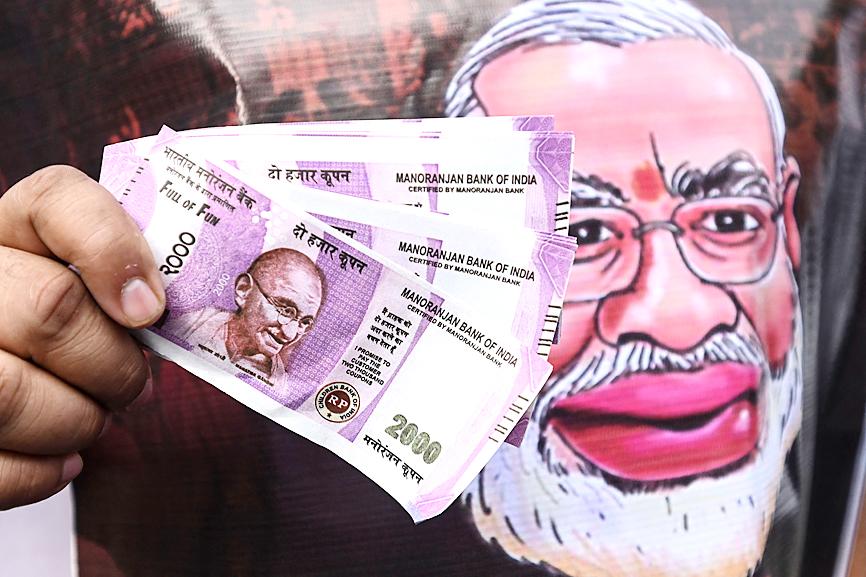India is planning progressive and forward-looking measures on issues related to cryptocurrencies, a move that could be a departure from its earlier attempts to restrict the use of virtual coins, people familiar with the matter have said.
Indian Prime Minister Narendra Modi led a review meeting on the digital currency on Saturday, and it was decided that the government would continue to proactively engage with experts and other stakeholders on the evolving technology, the people said, asking not to be identified.
A spokesperson at the prime minister’s office declined to comment.

Photo: AFP
There have been calls in India to impose stricter rules for transactions in virtual coins as an unregulated environment might push more domestic savings toward the asset class and could endanger household savings.
India has had a hot-and-cold relationship with digital currencies in the past few years. In 2018, it effectively banned cryptotransactions after a string of frauds following Modi’s sudden decision to eliminate 80 percent of the nation’s currencies, but the Indian Supreme Court struck down the restriction in March last year.
The Reserve Bank of India remains a critic, but is now working on a digital currency. The government might bring in a cryptobill for the Cabinet’s approval.
The meeting also concluded that attempts to mislead the country’s younger generation through over-promising and non-transparent advertisements should be stopped, the people said.
It was also discussed that unregulated cryptomarkets cannot be allowed to become avenues for money laundering and terror financing, they said.
The meeting also considered global examples and best practices, the people said.
It was highlighted that India should seek global partnerships and collective strategies on the issue, they said.
India’s parliamentary panel on finance is scheduled to meet industry experts and associations on challenges and opportunities in cryptofinance today.

Taiwan will prioritize the development of silicon photonics by taking advantage of its strength in the semiconductor industry to build another shield to protect the local economy, National Development Council (NDC) Minister Paul Liu (劉鏡清) said yesterday. Speaking at a meeting of the legislature’s Economics Committee, Liu said Taiwan already has the artificial intelligence (AI) industry as a shield, after the semiconductor industry, to safeguard the country, and is looking at new unique fields to build more economic shields. While Taiwan will further strengthen its existing shields, over the longer term, the country is determined to focus on such potential segments as

UNCERTAINTY: Innolux activated a stringent supply chain management mechanism, as it did during the COVID-19 pandemic, to ensure optimal inventory levels for customers Flat-panel display makers AUO Corp (友達) and Innolux Corp (群創) yesterday said that about 12 to 20 percent of their display business is at risk of potential US tariffs and that they would relocate production or shipment destinations to mitigate the levies’ effects. US tariffs would have a direct impact of US$200 million on AUO’s revenue, company chairman Paul Peng (彭雙浪) told reporters on the sidelines of the Touch Taiwan trade show in Taipei yesterday. That would make up about 12 percent of the company’s overall revenue. To cope with the tariff uncertainty, AUO plans to allocate its production to manufacturing facilities in

COLLABORATION: Given Taiwan’s key position in global supply chains, the US firm is discussing strategies with local partners and clients to deal with global uncertainties Advanced Micro Devices Inc (AMD) yesterday said it is meeting with local ecosystem partners, including Taiwan Semiconductor Manufacturing Co (TSMC, 台積電), to discuss strategies, including long-term manufacturing, to navigate uncertainties such as US tariffs, as Taiwan occupies an important position in global supply chains. AMD chief executive officer Lisa Su (蘇姿丰) told reporters that Taiwan is an important part of the chip designer’s ecosystem and she is discussing with partners and customers in Taiwan to forge strong collaborations on different areas during this critical period. AMD has just become the first artificial-intelligence (AI) server chip customer of TSMC to utilize its advanced

Chizuko Kimura has become the first female sushi chef in the world to win a Michelin star, fulfilling a promise she made to her dying husband to continue his legacy. The 54-year-old Japanese chef regained the Michelin star her late husband, Shunei Kimura, won three years ago for their Sushi Shunei restaurant in Paris. For Shunei Kimura, the star was a dream come true. However, the joy was short-lived. He died from cancer just three months later in June 2022. He was 65. The following year, the restaurant in the heart of Montmartre lost its star rating. Chizuko Kimura insisted that the new star is still down